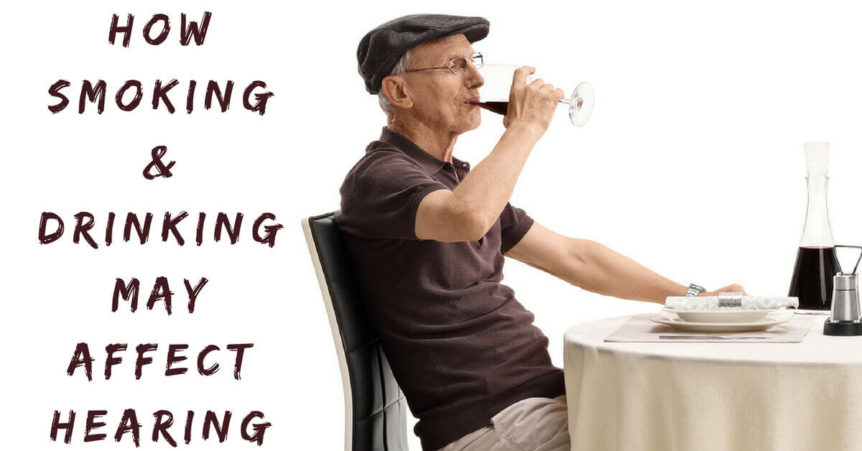For years you’ve been hearing that smoking and drinking are bad for your health. Both these activities can lead to some seriously negative health outcomes. Smoking has been linked to cancer and lung diseases like emphysema and chronic bronchitis, while heavy drinking puts you at risk for heart disease, stroke, and high blood pressure, as well as damaging your liver and pancreas. And if this wasn’t enough, there’s even more. What you might not know is that both smoking and drinking are affecting your hearing health too.
Smokers More Likely to Have Hearing Loss
Did you know that smoking is linked to hearing loss? Smokers are much more likely to suffer from hearing loss than non-smokers. Not only that, but the more you smoke, the worse your hearing health will be. Even if you don’t smoke, you might be at risk. Do you live with a smoker? Passive smokers, or people often exposed to second hand smoke, also increase their risk of hearing loss.
How Smoking Leads to Hearing Loss
While this may seem like an odd correlation, it’s actually pretty straight forward. It’s all about the nicotine. This is an ototoxic chemical, or a substance that damages your ears. Nicotine restricts blood flow, starving your cells of oxygen. The delicate cells in your inner ear are especially susceptible to this reduction in oxygen, and they can suffocate and die. Soon your range of hearing is reduced, and you’re left scrambling to understand what’s been said, or keep up with conversations.
A recent study looking at over 150,000 smoking and non-smoking adults found that the more you smoke, or the more you’re around people who smoke, the greater the chances that you’ll develop hearing loss. Smokers were over 15% more likely to have hearing loss than non-smokers! One interesting finding was that ex-smokers were actually less likely to have hearing loss than non-smokers. This is likely due to the fact that those who stop smoking usually make several over lifestyle changes to become healthier, so they lower their risk factors for hearing loss.
Drinking and Hearing Loss
No one will deny that a high consumption of alcohol is bad for you, and now we know that drinking is bad for your hearing too. Research from the University of Ulm in Germany tested heavy drinkers, as well as social drinkers, to test the links between alcohol and hearing loss. They found that alcohol consumption can damage the central auditory cortex in the brain, the region responsible for interpreting the sounds the ear picks up. When these cells are damaged or destroyed they can’t be repaired, so even moderate drinkers and social drinkers will start to see the effects of alcohol consumption on their hearing. Just like smoking, the more you drink the worse your hearing becomes.
When Temporary Becomes Permanent
Have you ever experienced temporary hearing loss after a night of heavy drinking? This is actually quite common, and is often a combination of alcohol consumption and loud music at the bar. Temporary hearing loss may disappear by morning, but what you don’t see is how much is damaging your brain. It’s only a matter of time before temporary hearing loss becomes permanent, and you start to notice gaps in what you can hear. Not only does alcohol damage the brain, it can also create a toxic environment in the blood, damaging the inner ear cells in the cochlea.
Saving Your Hearing
What’s the best way to stop this hearing loss in its tracks? Get healthy! If you’re a heavy smoker, or consume a lot of alcohol, it’s time to look at your lifestyle and make some changes to safeguard your health and keep your hearing sharp. There’s nothing wrong with having a drink every now and then, or enjoying a good cigar on a special occasion, but if you continue smoking and drinking you will hurt your body and your hearing health.
Already struggling with hearing loss? Come visit us at Custom Hearing Solutions to discuss your options to get you back to hearing. Our advanced hearing devices feature many unique programs and settings that will give you back the sounds you’ve been missing and fit seamlessly into your daily routine, whatever your lifestyle and needs.

